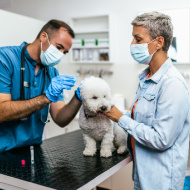Vets call for vigilance over Brucella canis

Latest government data reveals a spike in B canis cases since the start of 2020.
Veterinary teams are being urged to take extra precautions when handling suspected Brucella canis (B. canis) cases in all imported dogs and puppies.
The call from the British Veterinary Association follows reports of the first dog-to-human transmission of the zoonotic disease, which led to a woman being hospitalised and three pet dogs having to be euthanised.
Latest government data reveals a spike in B. Canis cases since the beginning of 2020, rising from just three the year before that to 107 in July this year. The dogs were either imported, had returned from a holiday abroad or bred with an imported dog.
In light of the rising cases, BVA is urging veterinary teams to:
- use appropriate PPE when handling suspected cases in all imported dogs
- submit samples to laboratories for testing
- flag risks of Brucella canis and other non-endemic diseases to clients considering importing a dog from or travelling with a dog to another country where the disease is endemic
- encourage compliance with import best practice in conversations with clients and rescue charities planning to bring in a dog from abroad.
“We know there is an added public health risk too, including for veterinary teams who treat and handle these animals, from contact with an infected dog’s contaminated body tissues and fluids.”
She added that the BVA will continue to call on the government to take urgent action to introduce stricter pet import measures, including mandatory pre-import testing.
“We are also calling for the strengthening of enforcement provisions and checks on dogs brought into the country through the commercial route,” she said.



 The Veterinary Medicines Directorate (VMD) is inviting applications from veterinary students to attend a one-week extramural studies (EMS) placement in July 2026.
The Veterinary Medicines Directorate (VMD) is inviting applications from veterinary students to attend a one-week extramural studies (EMS) placement in July 2026.